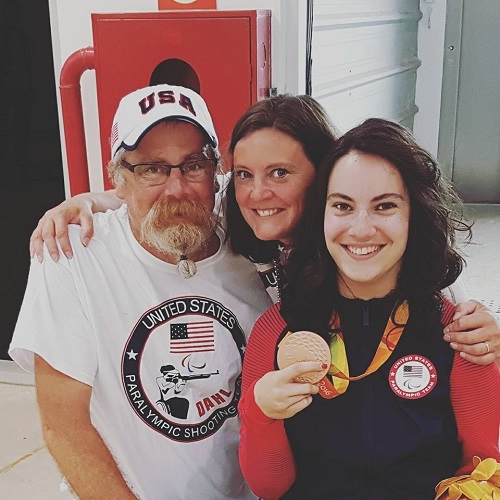Catching up with Paralympic medalist McKenna Dahl
October 10, 2016
Life has been a whirlwind for McKenna Dahl since her bronze medal-winning performance at the Paralympic Games in Rio, where she made history by becoming the first U.S. woman to medal in Shooting. Back in the States, she and Team USA were honored guests at the White House, where she met the President, First Lady, and Vice President.
We recently had a chance to catch up with her during her trip home to Arlington, WA. She’ll be heading back soon to the Olympic Training Center in Colorado Springs, CO, to continue her training and studies. Here’s what she had to say about her Paralympic experience:
What’s your training regimen like? Tell us about a typical day at the training center.
A normal day at the Olympic Training Center includes range time from 8am until 12pm. I work on specific skills to improve my overall position, score, or mental acuity. Lunch is followed by a session in the strength and conditioning gym, where my coach guides me though 45 minutes of weights, followed by 30-45 minutes of cardio. I often use the elliptical, treadmill, or hand-bike. Following my workout I will grab a few snacks and do schoolwork for the rest of the afternoon.
You worked so hard to get to Rio. How did it feel to finally arrive?
It was breathtaking. Rio is a beautiful city, and the Brazilian people were always so friendly. Entering the Paralympic Village for the first time helped everything sink in. I was thrilled to have the honor of representing the United States on the world's stage—and I was ready to go.
What kind of equipment do you use?
I shoot from my TiLite wheelchair, with a custom-made shooting table that comes off of it. I use an Anschutz, a .177 caliber air rifle made in Germany. The heavy leather shooting jacket I wear was handmade by Mouche. These jackets help keep us still and keep our heartbeats away from the gun.
How did the mental preparation compare to the physical?
The physical preparation cannot be overlooked by any means, but shooting is a 90% mental sport. My mental training was critical to my performance in Rio. The training included sessions on learning to control my heartbeat, keeping my nerves in check, and responding appropriately when something goes awry during a match.

Is it true that you were the youngest competitor and only female among the eight finalists? That must feel pretty good!
It was absolutely true. I finished third in the qualifying round, was the youngest competitor and the only female. I felt like it was a great honor to be among the best shooters in the world, and become one myself. I believe the new generation of shooters is coming up, and I'm proud to be among them.
What’s next for you?
I’m currently taking classes with DeVry University, working toward my Bachelor's Degree in Business and Technical Management. I will graduate in May 2017, after a 4-month break for the Paralympics. My plan is to continue residency at the Olympic Training Center in Colorado Springs and work towards the 2020 Paralympics in Tokyo.
What advice do you have for future Paralympic hopefuls?
Never give up. The adversity can seem overwhelming at times, but once you set your sights on a dream, do everything you can to make that dream a reality.
Anything else you’d like our readers to know?
Don't let anyone tell you that you cannot do something. Some tasks may take a little ingenuity to complete, and that's okay. Do what's best for you and never be afraid to try something new.
For more on McKenna’s Paralympic journey, watch our video. We have no doubt that she’s destined for even more success, both in the 2020 Games and any other goals she sets her sights on.